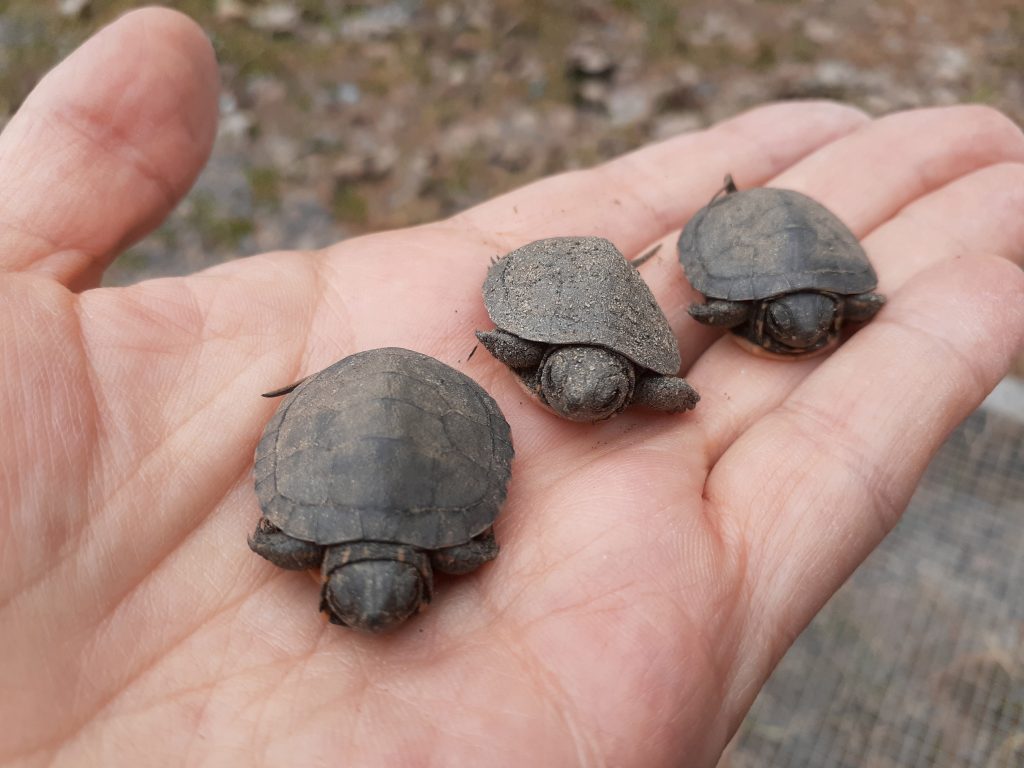Turtle season is well underway thanks to warmer temperatures this spring, and conservationists are asking Ontario residents to raise awareness and use caution on the roads in an effort to reduce turtle road mortality.
There are six turtle species in Muskoka, according to the Canadian Wildlife Federation, including painted, snapping, Blanding’s, map, musk and spotted turtles. The Saving Turtles At Risk Today (S.T.A.R.T.) Turtle Project launched in 2013 to help protect these species, which have been spotted earlier than usual this year due to warmer weather. Kelly Wallace, founder of the Think Turtle Conservation Initiative, was shocked to see so much turtle activity so early in the season.
“The turtles took us by surprise because they showed up early in response to the warmer temperatures, but then in the last couple weeks, the temperatures have dropped down again,” Wallace said. “We had a flurry of activity all the sudden. Even the little turtles that were overwintering, they were showing up early, which is really shocking because typically they’ll show up towards the end of April into May.”
Though temperatures continue to fluctuate, Wallace urges drivers to be ready for turtle crossings on the roads as spring progresses. Many of last year’s painted turtle hatchlings and other species stayed in their nest over winter due to cooler temperatures last fall, she said, so it’s also important to keep an eye out for hatchlings in gardens, lawns and driveways as well as on trails and roads.
Helping hatchlings get to their intended body of water and releasing them at a shallow water entry point with vegetation for protective covering and resting sites will give them a good start as they grow into adulthood, she said. For people looking to help the turtles across roadways, the most important thing to remember is that turtles should always be moved in the direction that they’re originally headed.
“Even if the turtle is walking away from a body of water, or it makes no sense to you, you have to because turtles always move with a mission,” she said. “If you turn them around, it means they’re going to end up back on that road going to the original destination… and they may not be so fortunate to have someone encounter them a second time.”
When handling turtles, people should also remember to wear gloves and hold the turtles as close to the ground as possible, as even a short fall can damage a turtle’s shell. Smaller turtles can be carried by the middle of the shell while snapping turtles need to be handled from the back with hands on either side of the tail. Stressed turtles may also pee during transport, so helpers should hold the turtle a few inches away from themselves just in case.
For those uncomfortable handling snapping turtles, Wallace recommends standing on the shoulder and safely alerting other drivers of the animal by pointing or waving. Some people even keep a snow shovel in their car during turtle season to scoop up or nudge along snappers on the road. No matter how the turtle is moved, it’s important to make sure they’re truly out of danger by helping them past road shoulders and into safer areas.
“You need to walk a bit further, even as far as 30 feet if you can, just to make sure that they’re out of the strike zone,” Wallace said. “Just in case they get startled or something and take off, you don’t want them to end up on the road again moments later.”
Road mortality is one of the foremost concerns for Ontario’s turtles, second only to habitat destruction, according to the Ontario Turtle Conservation Centre (OTCC). The centre is home to a turtle hospital that admitted 1,498 turtles in 2019 and another 1,095 in 2020.
While the decrease in numbers is a start, conservationists expected the number to be much lower given the limitations on travel caused by COVID-19. Now, organizations like the OTCC, Think Turtle and Turtle Guardians are intensifying their efforts to increase awareness by spreading information online and providing visual reminders through signage on roadways across Ontario.
“Every year awareness is increasing,” Wallace said. “Even last year, with it being a challenging year, still there [were] lots of people that were actually spending more time out in nature and they were sort of discovering and learning that they can be instrumental in helping turtles.”
Even with the limitations of the pandemic, there are still many opportunities to volunteer, Wallace said. The OTCC continues to operate as an essential service, which means they need turtle taxi drivers to bring injured animals to their facility in Peterborough.
For people who don’t want to join an organized volunteer group, there are still ways to help by reporting turtle sightings, nesting locations and the location of injured turtles. Nesting season is just around the corner from mid-May to mid-July, Wallace said, which is a great opportunity for people to practice citizen-based conservation and act as a steward to the turtles in their own backyard.
“The turtles need help,” she said. “The thing that’s important too is we’re also trying to get the message out and make people understand that even though the efforts are focused on helping turtles, by doing that, it’s one species actually helping all the other species that live alongside of [them].”
To get “Watch 4 Turtles” signs for your community this turtle season, or for more information on helping turtles, contact the Think Turtle Conservation Initiative at thinkturtle@yahoo.com or 647-606-9537. You can also visit the OTCC website to learn more.
If you find an injured turtle, call the OTCC hotline at 705-741-5000. To report a turtle sighting or nesting location, call or text the S.T.A.R.T. hotline at 705-955-4284.
